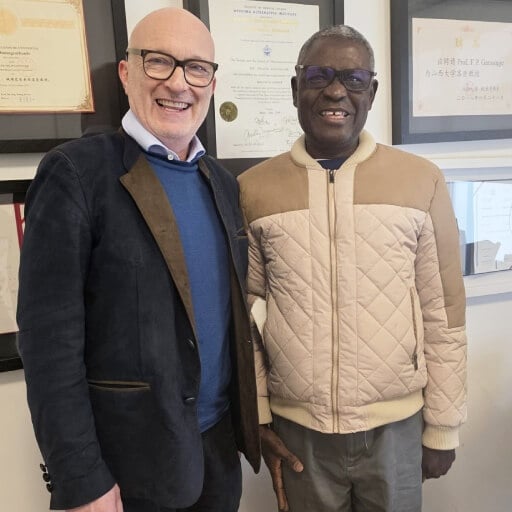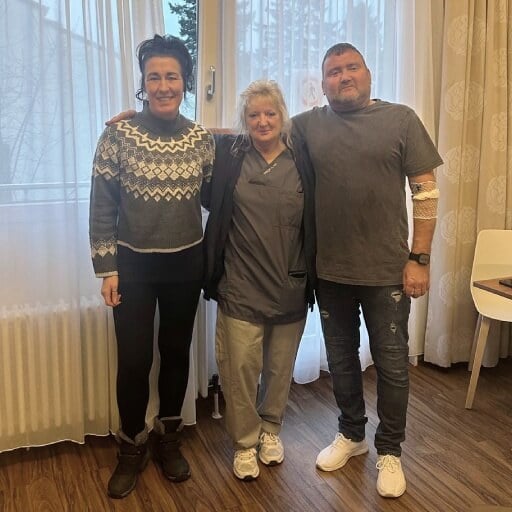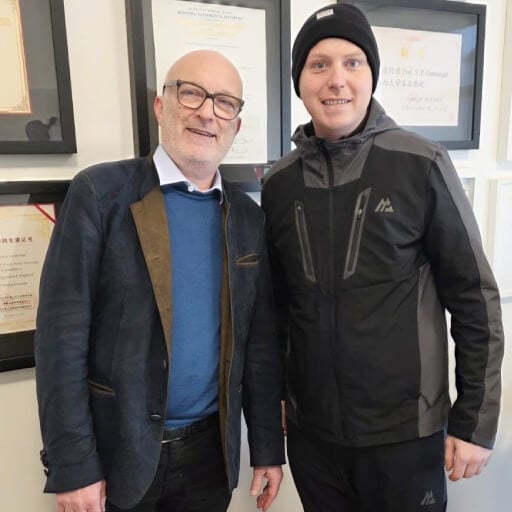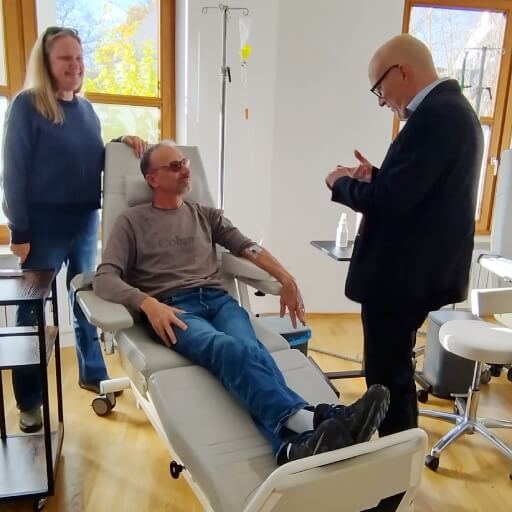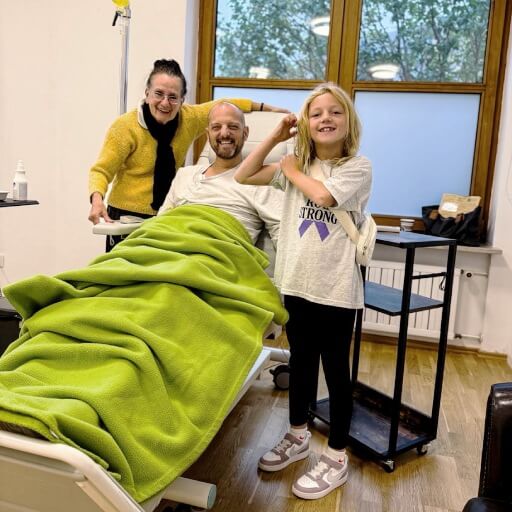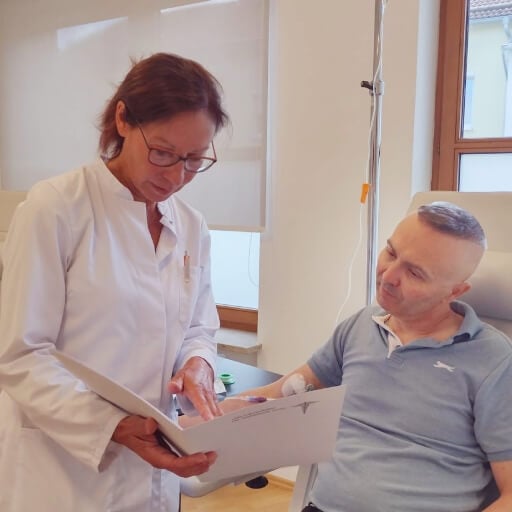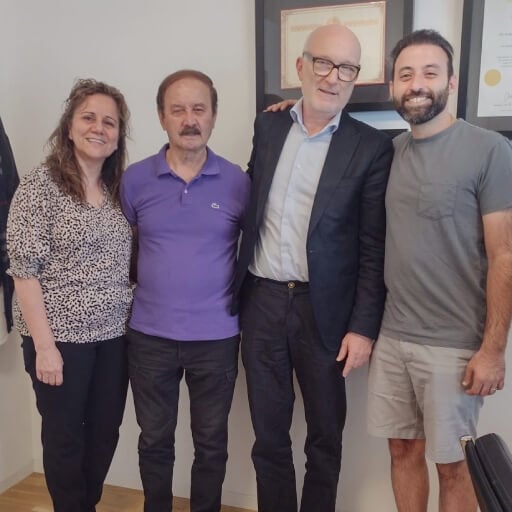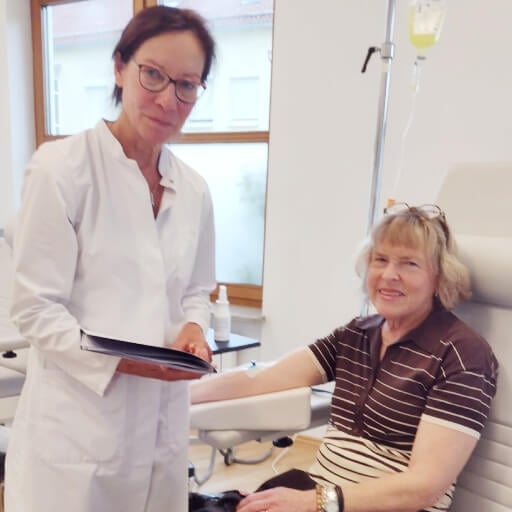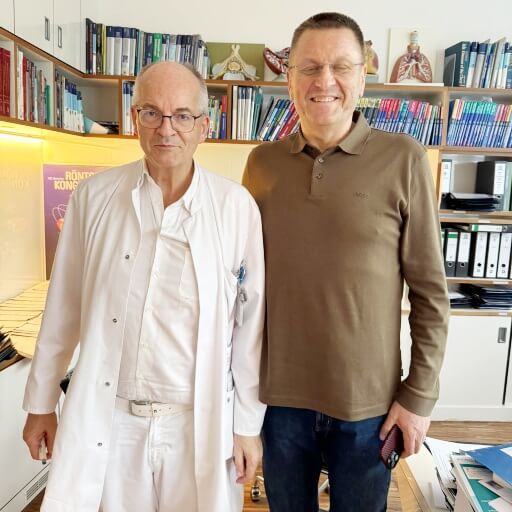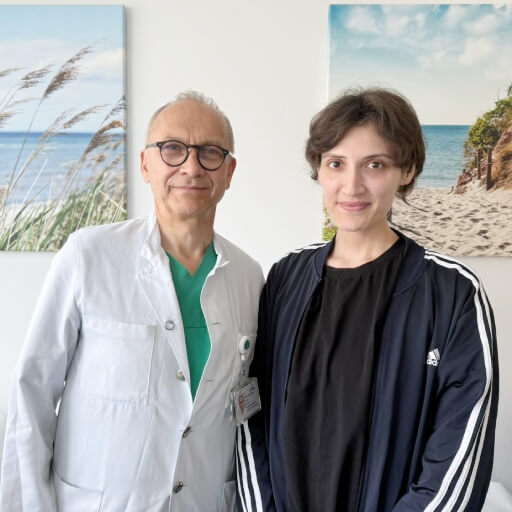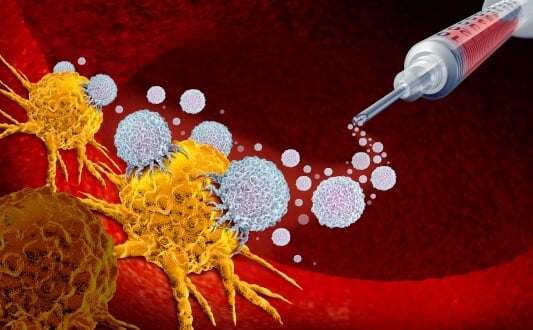Pancreatic cancer (ICD C25) is one of the most common gastrointestinal cancers. More than 300,000 new cases are diagnosed in the world every year. This tumor accounts for 3% of all cancers, which is a fairly high figure. The treatment methods offered in Germany allow for achieving excellent results, even at stage 4 of the pathology. German clinics report an improvement of 5-year survival rates by up to 38-52% with advanced intraperitoneal chemotherapy methods and immune-based treatments, significantly outperforming conventional approaches used globally.
Standard treatment of stage 4 pancreatic cancer and its risks
Stage four pancreatic cancer is diagnosed when a tumor is no longer localized: it has aggressively invaded the surrounding organs and spreads distant metastases to sites such as the liver, lungs, and peritoneum.
The main treatment methods in conventional approaches are chemotherapy and palliative interventions. Doctors use various procedures to alleviate the patient's condition and eliminate complications. Unfortunately, with standard treatments, the five-year survival rate for stage 4 pancreatic cancer remains very low, at approximately 1-3%. The median survival time typically ranges from 3 to 6 months without treatment and 6 to 11 months with standard chemotherapy protocols.
The use of classical treatment algorithms entails significant limitations and risks, such as:
- Classical chemotherapy for IV stage pancreatic cancer has a toxic effect on the healthy tissue and causes severe side effects including profound immunosuppression, gastrointestinal complications, and compromised quality of life
- All standard protocols require a long treatment course and are very expensive with limited cost-effectiveness relative to outcomes
- Almost all standard procedures have an unstable effect with high rates of treatment resistance developing within 3-6 months of therapy initiation
- Conventional approaches often fail to address the complex molecular profile of pancreatic tumors, treating them as a single disease entity rather than recognizing their heterogeneous nature
Germany uses sophisticated and cutting-edge treatment methods and innovative medical protocols, which deliver significantly superior outcomes and demonstrate remarkable survival rates in patients. These advanced approaches include personalized treatment selection based on comprehensive molecular diagnostics, intraperitoneal chemotherapy delivery systems (HIPEC and PIPAC), advanced embolization techniques for metastatic control, dendritic cell immunotherapy, and targeted biological approaches.
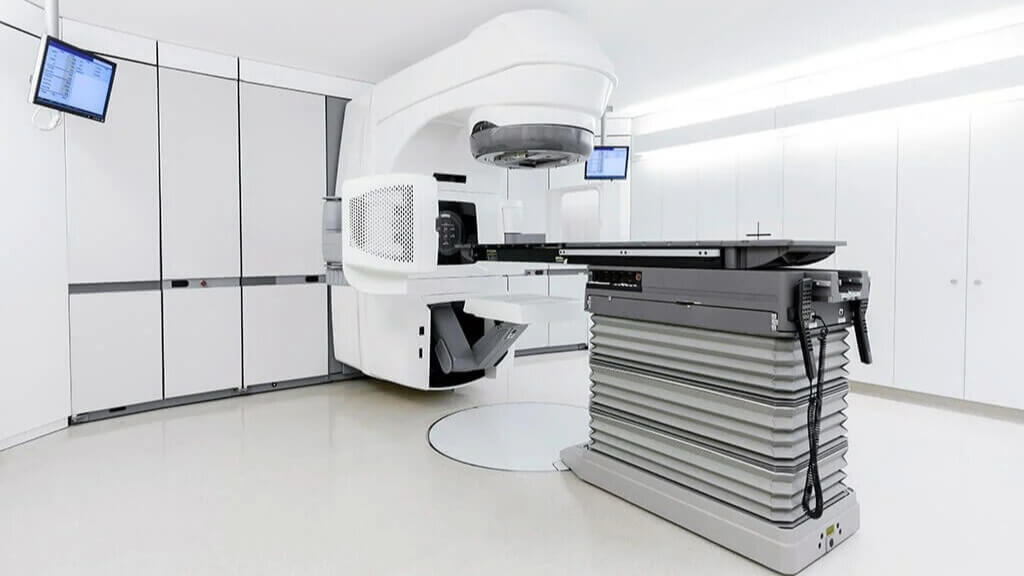
Innovative Treatment Methods for Stage 4 Pancreatic Cancer in Germany
New treatments for pancreatic cancer stage 4 help patients to significantly enhance quality of life and overall physical condition, while effectively preventing the development of complications or eliminating existing ones. Embolization and chemoembolization of metastases are used for precise local control of tumors and substantial increases in life expectancy. Drug therapy encompasses a comprehensive approach beyond chemotherapy, incorporating advanced dendritic cell vaccines and immunotherapy protocols. German doctors also pay meticulous attention to the management and relief of symptomatic manifestations.
Embolization of stage 4 pancreatic cancer metastases in Germany
The embolization technique aims to block the blood vessels supplying the pancreatic tumor and its metastases. For this purpose, doctors use emboli – special materials such as microspheres or spirals that are selected individually based on the vessel diameter.
Recently, German doctors have increasingly used one specific variation of the procedure – selective transarterial chemoembolization (TACE). This method involves the introduction of microspheres imbued with chemotherapy drugs as emboli.
The procedure combines two therapeutic effects: physical blockage of blood vessels, leading to oxygen starvation of cancer cells, and sustained release of high-concentration chemotherapy drugs directly to the tumor. This dual approach provides several significant advantages:
- Significant tumor size reduction, potentially enabling surgical options in previously inoperable cases
- Improved survival rates for stage 4 pancreatic cancer patients through targeted treatment
- Exceptional safety profile with only 2-5% risk of manageable side effects
- Ability to deliver higher chemotherapy concentrations than possible with systemic treatment
- Precise targeting of the tumor while protecting healthy tissue from damage
- Minimal recovery time due to outpatient treatment approach
- Option for repeated procedures to consolidate and enhance therapeutic effect
This innovative approach has demonstrated up to 38-55% improvement in five-year survival rates compared to conventional treatments, offering significant benefits for stage 4 pancreatic cancer patients. The complete treatment program typically spans up to 7 days and includes two TACE sessions performed 3-5 days apart. Throughout the program, patients receive comprehensive care including symptomatic treatment, nursing support, and detailed recommendations for further follow-up.
Four-Time Around the World with Metastatic Cancer: Prof. Kovács on Real Patient Outcomes
Regional chemotherapy treatment for stage 4 pancreatic cancer
Stage IV pancreatic cancer – the diagnosis most patients receive – demands extraordinary intervention. Germany's specialized centers, led by Prof. Aigner's Medias Clinic in Burghausen, have pioneered regional chemotherapy in the treatment of advanced pancreatic cancer with results that challenge conventional oncology's limitations. [1]
Standard chemotherapy fails stage 4 patients because medications dilute through the entire bloodstream before reaching tumors. Regional chemotherapy in Germany reverses this approach entirely. Specialized catheters deliver concentrated drugs directly to the pancreatic region through two distinct techniques. Intra-arterial infusion threads catheters through the groin to the celiac trunk, delivering medications in five-minute sessions over four consecutive days. The more intensive isolated upper abdominal perfusion (UAP-F) uses balloon catheters to temporarily isolate the upper abdomen, flooding it with concentrated drugs before 45-minute blood filtration removes remaining medications.
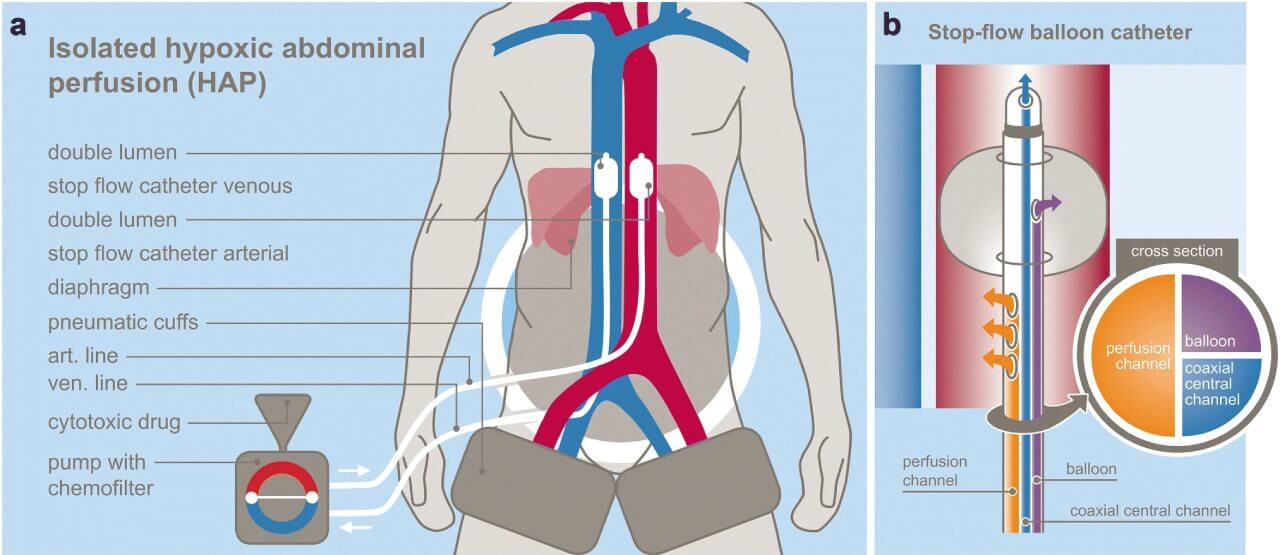
Prof. Aigner's landmark study of 280 stage 4 patients reveals the dramatic difference. The UAP-F technique achieved 8.7 months median survival versus 6.6 months with standard arterial infusion. One-year survival reached 37% compared to just 20.3%. Even at three years, 7.7% of UAP-F patients survived – outcomes previously considered impossible for metastatic disease. Perhaps most importantly, severe ascites resolved in 92% of cases, providing immediate relief from this agonizing complication. [1]
Treatment tolerability remained exceptional throughout. Side effects stayed predominantly WHO grades I-II, with patients experiencing minimal nausea and manageable fatigue. Those without prior heavy treatment showed only minor blood count changes – nothing resembling the devastating complications of systemic chemotherapy. Quality of life remained remarkably preserved.
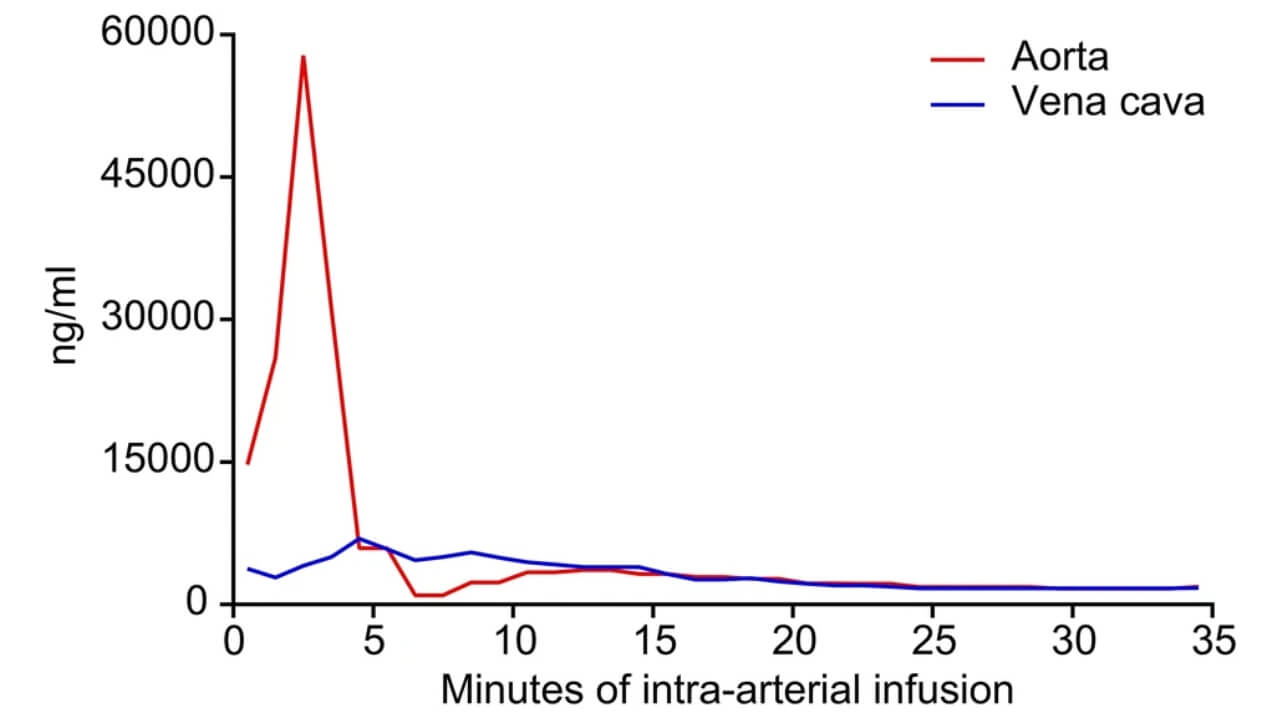
Electrochemotherapy (ECT) treatment for pancreatic cancer stage 4
Metastatic pancreatic cancer presents an almost insurmountable challenge – but electrochemotherapy emerges as a novel treatment for stage 4 pancreatic cancer that breaks through the disease's resistance mechanisms.
Pancreatic tumors develop dense fibrotic barriers that block chemotherapy penetration. ECT overcomes this defense through reversible electroporation – brief electrical pulses creating temporary membrane pores that allow medications to flood directly into cancer cells at concentrations 100-fold higher than conventional delivery achieves. This isn't theoretical: clinical results prove it works.
Treatment involves electrode placement around tumor sites under general anesthesia. Computer-controlled pulse generators coordinate electrical delivery with cardiac monitoring for complete safety. The procedure typically requires two treatment sessions spaced three weeks apart, with electrodes positioned at 2.5-3 cm intervals around the tumor perimeter. When combined with regional chemotherapy techniques, the synergistic effect becomes even more powerful.
Prof. Aigner's extensive German experience with ECT demonstrates remarkable outcomes even in heavily pretreated stage 4 patients [1]. Response rates reach 65% in recurrent pancreatic malignancies, with dramatic tumor reductions observed within days of treatment. An 80% reduction within a week? It happens. The technique proves especially valuable when metastases invade critical structures, making surgery impossible.
Treatment tolerability sets ECT apart from conventional approaches, and beyond direct tumor destruction, ECT triggers immunogenic cell death – releasing antigens that activate immune responses throughout the body; this is crucial for controlling metastatic disease.
In the following interview, Prof. Aigner shares insights from his pioneering work developing and refining electrochemotherapy for pancreatic cancer patients who have exhausted conventional options.
HIPEC (Hyperthermic Intraperitoneal Chemotherapy) for Stage 4 Pancreatic Cancer in Germany
HIPEC is a specialized treatment approach that combines surgery to remove visible tumors with heated chemotherapy delivered directly into the abdominal cavity. This dual approach targets both visible tumors and microscopic cancer cells that conventional treatments might miss.
For patients with stage 4 pancreatic cancer with peritoneal metastases, HIPEC offers an important treatment option that can significantly improve survival rates and quality of life when compared to standard treatments alone.
To provide more insight into this advanced treatment approach, we interviewed Dr. Michael Lipp, a leading specialist from the Department of General and Abdominal Surgery, Hepatopancreatobiliary Surgery and Hernia Surgery at the Asklepios Hospital Barmbek Hamburg. With extensive experience performing HIPEC procedures since 2015, Dr. Lipp shares valuable information about this specialized treatment, patient selection criteria, and expected outcomes.
For eligible patients, HIPEC has shown a remarkable 22-35% improvement in five-year survival rates, offering substantially better outcomes than conventional therapies for those with peritoneal metastases from pancreatic cancer.
Leading German Surgeon Dr. Lipp Reveals the Power of HIPEC in Cancer Treatment
PIPAC (Pressurized Intraperitoneal Aerosol Chemotherapy) for Stage 4 Pancreatic Cancer in Germany
PIPAC is a minimally invasive procedure that delivers chemotherapy directly to cancer cells in the peritoneal cavity using pressurized aerosol technology. This innovative approach allows for better drug penetration into tumor tissues while minimizing systemic side effects.
During the PIPAC procedure, surgeons make 2-3 small incisions in the abdomen and use laparoscopic techniques to assess the extent of disease. A specialized nebulizer device converts chemotherapy drugs into a fine mist that is sprayed under pressure throughout the abdominal cavity. This pressurized delivery ensures the medication reaches deep into tumor tissues more effectively than traditional liquid chemotherapy.
The entire treatment program at German clinics includes comprehensive pre-procedure assessment, the PIPAC procedure itself, and post-procedure care, lasting approximately 5 days. Unlike HIPEC, PIPAC can be repeated multiple times at intervals of several weeks, making it a valuable option for patients who may benefit from ongoing treatment.
Key advantages of PIPAC for stage 4 pancreatic cancer patients:
- Minimally invasive with shorter recovery time than open surgical procedures
- Reduced systemic side effects compared to traditional chemotherapy
- Can be repeated multiple times to enhance the therapeutic effect
- Option for patients who may not be candidates for more extensive surgical procedures
- Potential to improve quality of life while managing advanced disease
Studies from German centers report 25-32% improvement in five-year survival rates with PIPAC treatment, providing a valuable therapeutic option for patients with peritoneal disease who require ongoing treatment with minimal disruption to their quality of life.
Targeted therapy for the treatment of stage 4 pancreatic cancer in Germany
In modern medicine, targeted therapy is becoming more and more popular. This is drug therapy that affects the cellular mechanisms of tumors. The fact is, cancer cells can contain many protein molecules, which support their growth and multiplication. They appear due to specific mutations in genes. Medicines can block the activity of such molecules and therefore, reduce the tumor size. Targeted therapy works especially well when it is combined with chemotherapy.
To treat stage 4 pancreatic cancer, doctors in Germany use EGFR inhibitors, drugs that block the activity of the EGFR protein. This protein is responsible for the rapid growth of the cancer cells. Therefore, as a result, the tumor grows slowly and stabilizes in size. This drug is taken in the form of tablets, once a day.
If the NTRK gene has mutations, the treatment may involve the use of receptor tyrosine kinase inhibitors. The drugs in this group block the activity of growth factors, which are required for cellular activity. They started to be used fairly recently: since 2018 in the United States, and since 2019 in Europe.
Immunotherapy for the treatment of stage 4 pancreatic cancer in Germany
Stage 4 pancreatic cancer is rarely characterized by MMR gene mutations and unusual types of the molecular pathogenesis of the tumor – microsatellite instability (MSI-H). However, in such cases, it is possible to use immunotherapy, a treatment with drugs from the group of checkpoint inhibitors. The active substances of these drugs are able to block certain molecules on the surface of the cancer cells, allowing the tumor to avoid an immune attack.
Checkpoint inhibitors (blockers) do not damage cancer cells. They only reduce the ability of the tumor to conceal itself from the immune system. Therefore, this therapy does not cause any complications and is well tolerated. When combined with chemotherapy, this treatment demonstrates excellent results – the tumor is reduced in size and well controlled.
Dendritic Cell Therapy for Stage 4 Pancreatic Cancer in Germany
Dendritic cell therapy is an innovative immunotherapy approach that harnesses the patient's immune system to fight cancer by creating a personalized vaccine from the patient's blood cells. This groundbreaking therapeutic approach is based on the pioneering work of Dr. Ralph Steinman, who discovered dendritic cells and was awarded the Nobel Prize in Medicine in 2011 for his revolutionary findings. The treatment program includes:
- Initial visit with comprehensive examination, blood tests, and collection of blood sample for manufacturing the individual LANEX-DC® vaccine
- Manufacturing of the personalized vaccine in the laboratory over approximately one week
- Second visit for vaccine administration, including supportive therapy and medical monitoring
- Outpatient treatment format with minimal side effects and good tolerability
- Specialized follow-up care and monitoring as needed
Clinical data shows that dendritic cell therapy can improve five-year survival rates by up to 60% compared to standard treatment protocols, making it one of the most promising immunotherapeutic approaches for advanced pancreatic cancer. To provide more detailed insights about this innovative treatment approach, we interviewed Professor Frank Gansauge, a renowned expert in immunotherapy with over 22 years of experience in dendritic cell therapy. As the head of LDG Laboratories, Prof. Gansauge has been at the forefront of developing and implementing this treatment method. In this interview, he shares valuable information about the therapy's mechanisms, effectiveness, and patient selection criteria.
"Every Patient Deserves Individual Approach": Interview with Renowned German Immunologist Prof. Gansauge
Alternative infusion immunotherapy for stage 4 pancreatic cancer in Germany
Alternative infusion immunotherapy is an innovative treatment approach that combines various biological substances and natural compounds to strengthen the immune system and fight cancer cells. A comprehensive 14-day program includes:
- Initial evaluation with detailed medical history review, comprehensive laboratory tests including complete blood count, biochemical analysis, inflammation markers, coagulation tests, and specialized diagnostics like liquid biopsy and RGCC test
- 20 sessions of targeted infusion therapy utilizing a combination of natural compounds including Artesunate, Chlorin E6, Curcumin, DCA, DMSO, GcMAF, Hypericin, and high-dose vitamin therapy
- Complementary treatments including 4 sessions of regional hyperthermia, 10 sessions of ozone therapy, and 10 sessions of ion therapy
- Regular monitoring and nursing care throughout the treatment period
- Final examination with detailed recommendations for further care
This integrative approach combines biological therapies with conventional treatments to enhance effectiveness while minimizing side effects. The method has demonstrated success in supporting cancer patients' recovery by strengthening their immune system and improving their body's natural healing processes.
Why Germany is a Leader in Stage 4 Pancreatic Cancer Treatment
Patients from all over the world can undergo high-quality cancer treatment in German hospitals. In most cases, therapy at the advanced stages of pancreatic cancer (PC) is successful – doctors prolong the life of patients, improve its quality and pancreatic cancer prognosis. This is possible due to the following conditions:
- Modern diagnostics – molecular genetic tests of cancer cells, which allow doctors to individually select an effective treatment method;
- The best equipment and advanced cancer therapy options – German hospitals have modern equipment and the very latest drugs;
- Innovative methods – German hospitals constantly develop and implement new therapeutic approaches for cancer treatment;
- Leading specialists – prior to obtaining a license, German oncologists undergo long training and internships in the best medical facilities in the world.
Every year, Germany’s government allocates huge funds to the development of the medical sector, which enables the high level of medicine in Germany.
| Benefits | Side Effects | Survival Improvement | Quality of Life Impact | |
|---|---|---|---|---|
| Conventional therapy | Widespread, more accessible | Severe (65-80% toxicity rate) | Baseline: 1-3% five-year survival rate | Significant decline during treatment |
| Chemoembolization (TACE) | Targeted delivery directly to the tumor with dual therapeutic action | Minimal (2-5% risk of manageable side effects) | 38-55% improvement in five-year survival rate | Maintains quality of life with less systemic impact |
| Dendritic Cell Therapy | Personalized immune response targeting specific cancer cells | Very low (approximately 1%) | 50-60% improvement in five-year survival rate | Enables better long-term disease management |
| HIPEC | Combines surgery with heated chemotherapy for comprehensive treatment | Moderate and manageable under specialist care | 22-35% improvement in five-year survival rate | Maintains normal daily activities during treatment |
| PIPAC | Minimally invasive with pressurized aerosol delivery for better drug penetration | Low to moderate with shorter recovery time | 25-32% improvement in five-year survival rate | Minimal disruption to daily life with potential for repeated treatments |
Top Clinics for Stage 4 Pancreatic Cancer Treatment in Germany
Stage 4 pancreatic cancer is treated by a tumor board, which includes gastroenterologists, oncologists, and surgeons. As a rule, such tumor boards are only available in large university hospitals:
- LDG Laboratories Dr. Gansauge Berg
- University Hospital Frankfurt am Main
- Asklepios Hospital Barmbek Hamburg
- Clinic of Advanced Biological Medicine Frankfurt am Main
- Hyperthermia Center Hannover
Cost of Stage 4 Pancreatic Cancer Treatment in Germany
Germany offers high-quality medical care for stage 4 pancreatic cancer patients while maintaining reasonable treatment costs. Unlike many other countries, German hospitals provide transparent pricing without hidden fees. Through cooperation with Booking Health, international patients can receive significant cost reductions due to direct contracts with hospitals and the elimination of additional charges for foreign patients.
| Treatment program | Cost in Germany (EUR) | USA (EUR) | UK (EUR) |
|---|---|---|---|
| Chemotherapy | 7,300 - 12,100 | 40,000 - 55,000 | 12,000 - 20,000 |
| Chemoembolization | 6,500 - 24,000 | 50,000 - 80,000 | 40,000 - 65,000 |
| Dendritic cell therapy LANEX-DC | 20,000 - 38,000 | 60,000 - 90,000 (not widely available) | Not widely available |
| PIPAC | 18,000 - 20,000 | 50,000 - 80,000 | 21,000 - 25,000 |
| HIPEC | 55,000 - 75,000 | 100,000 - 150,000 | 60,000 - 82,000 |
The final cost of treatment depends on several factors:
- Stage of the disease
- Selected treatment methods and their combination
- Number of required procedures
- Length of hospital stay
- Need for additional medications or supportive therapy
For precise cost calculations and the development of an individual treatment plan, please contact Booking Health.
Success Stories of Stage 4 Pancreatic Cancer Patients
Treatment success stories provide hope and valuable insights for patients considering cancer treatment in Germany. One such inspiring example comes from the family of Robert Franklin Smith, who traveled from the United States to Germany in 2024 seeking treatment for pancreatic cancer with liver metastasis.
After undergoing liver metastasis resection surgery, Mr. Smith was continuing his chemotherapy treatment when his family learned about additional therapeutic options available in Germany. Together with his wife, they made the decision to visit Dr. Gansauge at LDG Laboratories in Berg, Germany, to explore dendritic cell therapy as a complementary treatment approach.
Mrs. Smith shares their experience: "My husband and I had the opportunity to visit Dr. Gansauge in Berg, Germany, for dendritic cell therapy. Booking Health managed every aspect of our experience, from detailed communications to accommodations, translators, and transfers. The entire team was exceptionally professional and friendly, and Dr. Gansauge – both a doctor and a professor – impressed us with his expertise and delightful sense of humor. This treatment has offered us hope and represents an option that we were not presented with within the United States."
The Smiths' experience demonstrates how German medical facilities combine innovative therapies with traditional treatment methods to provide comprehensive care for stage 4 pancreatic cancer patients. Their story also highlights the importance of professional support in organizing medical tourism, ensuring that patients and their families can focus entirely on treatment and recovery.
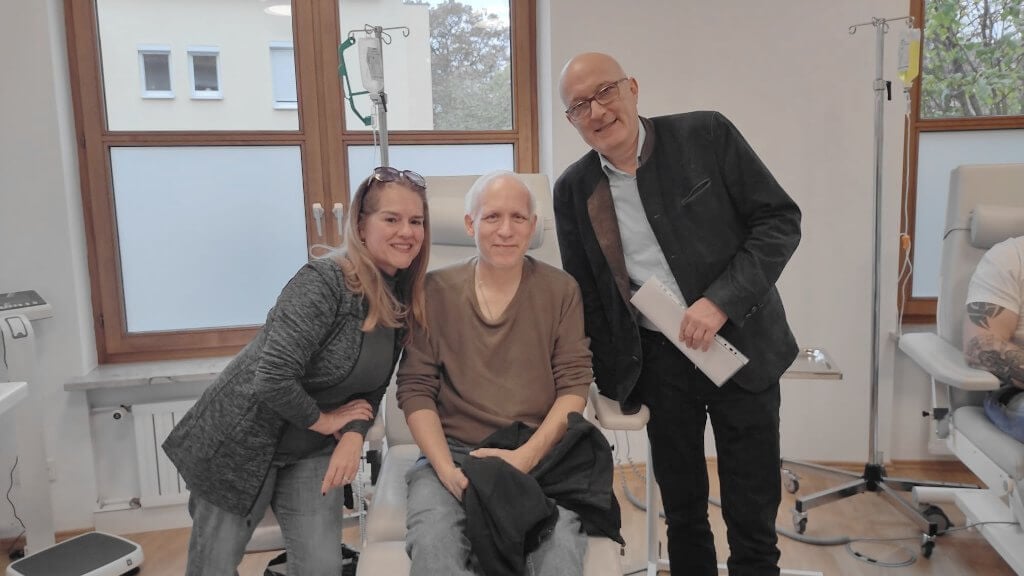
How to undergo stage 4 pancreatic cancer treatment in Germany?
To undergo high-quality treatment for stage 4 cancer in leading European hospitals, you can rely on Booking Health, an international medical tourism organizer. The company stands out for its professional medical consultation and clinic selection, priority access to leading German oncologists, and exclusive direct contracts with hospitals that guarantee the most favorable prices.
Booking Health provides comprehensive support throughout your medical journey, offering the following services:
- Professional selection of the most suitable German cancer center and development of a personalized treatment program based on your medical history
- Priority scheduling of consultations and treatment appointments with leading oncologists, ensuring urgent access when time is critical
- Significant cost reduction through direct hospital contracts, elimination of additional foreign patient fees, and strict financial control including the return of unspent funds
- Complete preparation of medical documentation and arrangement of insurance coverage against treatment complications
- Comprehensive travel support including flight booking, accommodation arrangements, airport pickup, and medical transfers
- Personal medical coordinator available 24/7 to assist with all aspects of your treatment journey
- Organization of medication purchases and delivery to ensure continuous treatment
- Post-treatment support including direct communication with German doctors after returning home and arrangement of follow-up care
- Interpreter services and assistance with all communication between you and medical staff
- Monitoring of your medical program at all stages to ensure the highest quality of care
You can learn more about specific treatment programs and their costs by submitting your request on the official bookinghealth.com website. The Booking Health team will promptly provide detailed information about treatment options in Germany tailored to your case.
Every Patient Has a Story: Booking Health Treatment Journeys that Inspire
Frequently asked questions of our patients with advanced pancreatic cancer
Send request for treatmentTreatment options include chemotherapy, targeted therapy, immunotherapy, and palliative care. Advanced treatments like Nano-Knife and participation in clinical trials may also be available, offering hope for improved outcomes.
Benefits include access to cutting-edge treatments, experienced specialists, and comprehensive care plans tailored to individual patient needs. German clinics often offer innovative therapies and clinical trials not widely available elsewhere.
Effectiveness is monitored through regular imaging tests, blood tests, and clinical evaluations. These assessments help doctors determine the impact of the therapy and make necessary adjustments.
Risks depend on the specific treatment but can include side effects such as nausea, fatigue, and increased susceptibility to infections. Close monitoring and supportive care help manage these risks.
While a cure for stage 4 pancreatic cancer is rare, advanced treatments in Germany can help manage the disease, prolong life, and improve quality of life. Treatment aims to control the cancer and alleviate symptoms.
Germany offers the best value: €20,000-€75,000, depending on the method. In the UK prices range €21,000-€82,000; in the USA – €40,000-€150,000. Booking Health will help you navigate treatment costs.
With treatment in specialized German hospitals, patients receive better survival and quality of life. What is important, innovative options are more effective/less toxic than conventional ones.
Unfortunately, standard chemotherapy causes severe reactions in most patients. Innovative methods – like chemoembolization, dendritic cell therapy, PIPAC and HIPEC – have low or mild side effects.
Yes, it is. Modern treatments increase 5-year survival from 1-3 % with standard therapy to 25-60 % with innovative methods.
Conventional chemotherapy reduces it dramatically. Innovative methods maintain or improve quality of life, thus they are more beneficial in debilitated cancer patients.
Pancreatic cancer treatment in Germany combines advanced treatments (interventional radiology, dendritic cell therapy, TACE and PIPAC) with standard oncological care. This approach allows for the best control of the tumor process and symptoms.
Patients in Germany receive care in certified centers with multidisciplinary teams. Here hospitals provide access to innovative treatments and combination approaches.
Choose treatment abroad and you will be sure to get the best results!
Authors:
This article was edited by medical experts, board-certified doctors Dr. Nadezhda Ivanisova, and Dr. Bohdan Mykhalniuk. For the treatment of the conditions referred to in the article, you must consult a doctor; the information in the article is not intended for self-medication!
Our editorial policy, which details our commitment to accuracy and transparency, is available here. Click this link to review our policies.
Source:
[1] Aigner, K.R., Gailhofer, S., Selak, E. et al. Intra-arterial infusion chemotherapy versus isolated upper abdominal perfusion for advanced pancreatic cancer: a retrospective cohort study on 454 patients. J Cancer Res Clin Oncol 145, 2855–2862 (2019). https://doi.org/10.1007/s00432-019-03019-6. [DOI]
Read:
Dendritic cell therapy in cancer treatment in Germany - Vaccination against cancer
New Effective Treatments for Stage 4 Cancer: Innovations in Oncology
Top 10 Leading Oncology Hospitals for Cancer Treatment in Germany
Article menu:
- Standard treatment of stage 4 pancreatic cancer and its risks
- Innovative Treatment Methods for Stage 4 Pancreatic Cancer in Germany
- Why Germany is a Leader in Stage 4 Pancreatic Cancer Treatment
- Top Clinics for Stage 4 Pancreatic Cancer Treatment in Germany
- Cost of Stage 4 Pancreatic Cancer Treatment in Germany
- Success Stories of Stage 4 Pancreatic Cancer Patients
- How to undergo stage 4 pancreatic cancer treatment in Germany?
- Frequently asked questions of our patients with advanced pancreatic cancer
Don't know where to start?
Contact Booking Health
